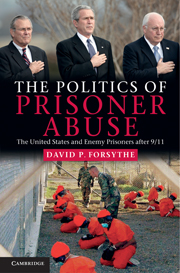Book contents
- Frontmatter
- Contents
- Preface
- List of abbreviations and acronyms
- 1 Torture and political morality in historical perspective
- 2 Political morality and the Bush Administration
- 3 Bush lawyers: the politics of legal interpretation
- 4 The military: Afghanistan, Guantánamo, Iraq
- 5 The CIA: kidnapping, Black Sites, extraordinary rendition
- 6 Due process: detention classification, Military Commissions
- 7 Prisoner abuse and the politics of transitional justice
- Annex A Cast of principal characters
- Annex B Reports on US policy toward enemy prisoners
- Annex C Some relevant legal norms: selected provisions
- Annex D Timeline, selected events, Bush Administration
- Index
- References
1 - Torture and political morality in historical perspective
Published online by Cambridge University Press: 05 June 2012
- Frontmatter
- Contents
- Preface
- List of abbreviations and acronyms
- 1 Torture and political morality in historical perspective
- 2 Political morality and the Bush Administration
- 3 Bush lawyers: the politics of legal interpretation
- 4 The military: Afghanistan, Guantánamo, Iraq
- 5 The CIA: kidnapping, Black Sites, extraordinary rendition
- 6 Due process: detention classification, Military Commissions
- 7 Prisoner abuse and the politics of transitional justice
- Annex A Cast of principal characters
- Annex B Reports on US policy toward enemy prisoners
- Annex C Some relevant legal norms: selected provisions
- Annex D Timeline, selected events, Bush Administration
- Index
- References
Summary
The interrogation of someone like a terrorist suspect can be a real ethical dilemma. The available options may all be bad in some way.
(David Perry, Professor of Ethics, US Army War College, quoted in the Christian Science Monitor, May 26, 2004)September 11, 2001 confronted the George W. Bush Administration with tough choices – to put it mildly. Any democratic government would have faced tough choices responding to similar events, given the Al-Qaeda attacks on New York and Washington that killed just under 3,000 persons, mostly civilians. (The 1941 Japanese attack on Pearl Harbor, preventive self-defense in the Japanese view, their version of the Bush Doctrine, had killed a little more than half that number, mostly military personnel.) When it came to treatment of what were called terror suspects or more generally enemy or security prisoners, which is the focus of this study, many liberal democratic governments had faced tough choices in the past: the British in dealing with violence by the Provisional Irish Republican Army (IRA) concerning Northern Ireland, the West German government in dealing with attacks on civilians by the Red Army Faction and other violent groups, Italy confronting the Red Army Brigades, Spain wrestling with ETA (Euskadi Ta Askatasuna, the nationalist/separatist organization) about Basque issues, India in dealing with Islamic militants incensed over New Delhi's control over much of Kashmir from 1947, Israel in dealing with Palestinian and other attacks since 1948 and especially after 1967, etc.
- Type
- Chapter
- Information
- The Politics of Prisoner AbuseThe United States and Enemy Prisoners after 9/11, pp. 1 - 27Publisher: Cambridge University PressPrint publication year: 2011

